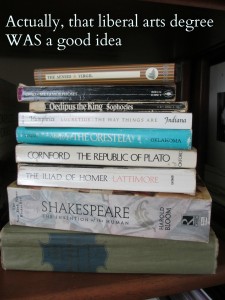 Students increasingly seek after liberal arts degrees, as it imparts comprehensive educational skills that they can apply to various jobs. Such students equip themselves with various skills including writing and communication. A well-written resume that conveys all one wants to impart and holds the attention of the potential employer is very important. Getting across your views and being able to do so in a precise and concise way is a valuable asset, and a student with a liberal arts major is trained to achieve superior communication and writing skills. They are able to write effective resumes and letters and market themselves effectively. It is not uncommon for them to gain higher positions with good salaries.
Students increasingly seek after liberal arts degrees, as it imparts comprehensive educational skills that they can apply to various jobs. Such students equip themselves with various skills including writing and communication. A well-written resume that conveys all one wants to impart and holds the attention of the potential employer is very important. Getting across your views and being able to do so in a precise and concise way is a valuable asset, and a student with a liberal arts major is trained to achieve superior communication and writing skills. They are able to write effective resumes and letters and market themselves effectively. It is not uncommon for them to gain higher positions with good salaries.
Communication
A majority of the workforce in many businesses needs training to improve their writing skills. Companies spend a substantial amount of money for this training. A person who is able to get across the policies, plans and decisions to employees located in different areas is a huge asset to any organization. Clear communication saves time and money. The person receiving the communication is able to get the message and is able to implement it effectively. A liberal arts graduate is able to effectively get across policies and procedures with his excellent communication skills.
When a student completes the degree plan, he gains personal qualities and skills that are sought after by employers. Teamwork skills, analytical skills, communication skills, computer skills, interpersonal skills, strong work ethics, willingness to take initiative and responsibility, flexibility, an eye for detail, and ability to think out of the box are a few qualities and skills one learns. The modules and course structures are formulated to increase problem-solving skills and enhance critical thinking. They are made aware of the various problems and ills that affect the society. The student gets insight into the culture and customs of people belonging to different communities in different parts of the country and world. He is acquainted with race, gender, education, class and other factors that affect the society and work. The student is made aware of the cultural differences and taught to see things from different perspectives and have empathy.
An Array of Knowledge and Skills
He is able to work with people with different views for the betterment of the organization for which he works. The education prepares him for a range of careers in diverse areas of work. It is unlike a professional bachelor’s degree that qualifies a student for a specific job.
This degree assists his quest for knowledge and helps him find solutions to various ills that affect the society. Such a student gains knowledge in various subjects, like media and communication, history, science and technology, literature, language, philosophy, history, mathematics, psychology, education and many more.
They get well-rounded education unlike students who enroll for other degree courses that focus only on a specific subject and equips them for specific jobs. They are able to converse on a range of topics and hold meaningful and intelligent discussions on numerous political, economic and social issues. The problem solving skills they learn help them tackle and find solutions to various issues. The liberal arts degree encourages free thinking and free expression. The decision making skills the students are trained in qualify them for higher positions in the work place.
Your options are open
If you are looking at options to pursue higher education, liberal arts degrees are still a promising choice. More and more students are opting for liberal arts instead of pursuing technical, medical vocational training or a course in business education. Some of the best educational institutions offer a Liberal arts degree plan that enables one to pursue a vocation in any field, including politics.
Author Bio
Ryan Ayers is a writer who creates informative articles in relation to the field of education. In this article, he describes the benefits of a liberal arts degree and aims to encourage further study with an art education online degree.
